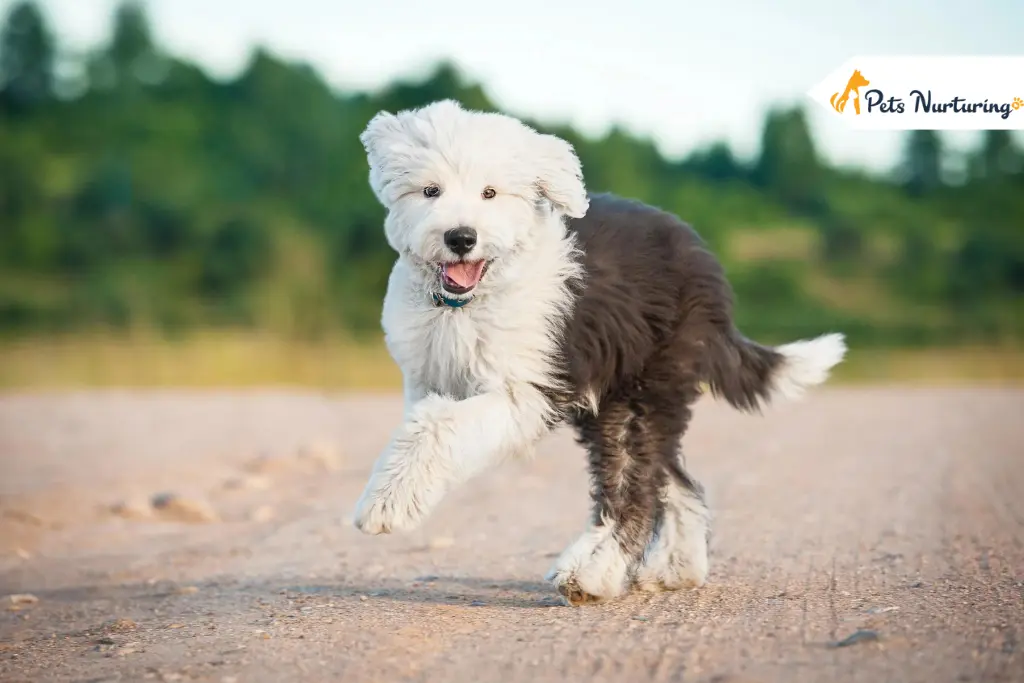
Take home this cute, cuddly, and fluffy dog breed—the Sheepadoodle!
We’re talking about the popular dog breed that is the result of cross-breeding an Old English sheepdog and a Standard Poodle. This breed has the intelligence and hypoallergenic traits of the Standard Poodle and the hyperactive and herding instincts of the Old English Sheepdog. Known for their curly, often non-shedding coats and fun personalities, these dogs are great family pets. These canines are perfect for individuals looking for an active, friendly dog with hypoallergenic qualities.
Today, in this blog, I will be sharing all the vital, detailed information about the Sheepadoodle breed. From its origin and personality traits to appearance and its cost, I’ve tried to cover every detail that you need to know before getting a Sheepadoodle puppy. So keep reading till the end and figure out whether this breed is right for you or not!
Let’s begin.
Sheepadoodle Dog Overview
Breed Group: Herding
Height: 13 inches to 24 inches tall (Male), 13 inches to 24 inches (Female)
Weight: 60 pounds to 80 pounds (Male), 40-60 pounds (Female)
Lifespan: 12 to 15 years
Coat: thick, long, and curly.
Coat colors:: black, white, sable, apricot, cream, black and white, gray, and brown.
Temperament: Playful, sociable, and obedient
Needs for Grooming:: High
Hypoallergenic:: Yes
History
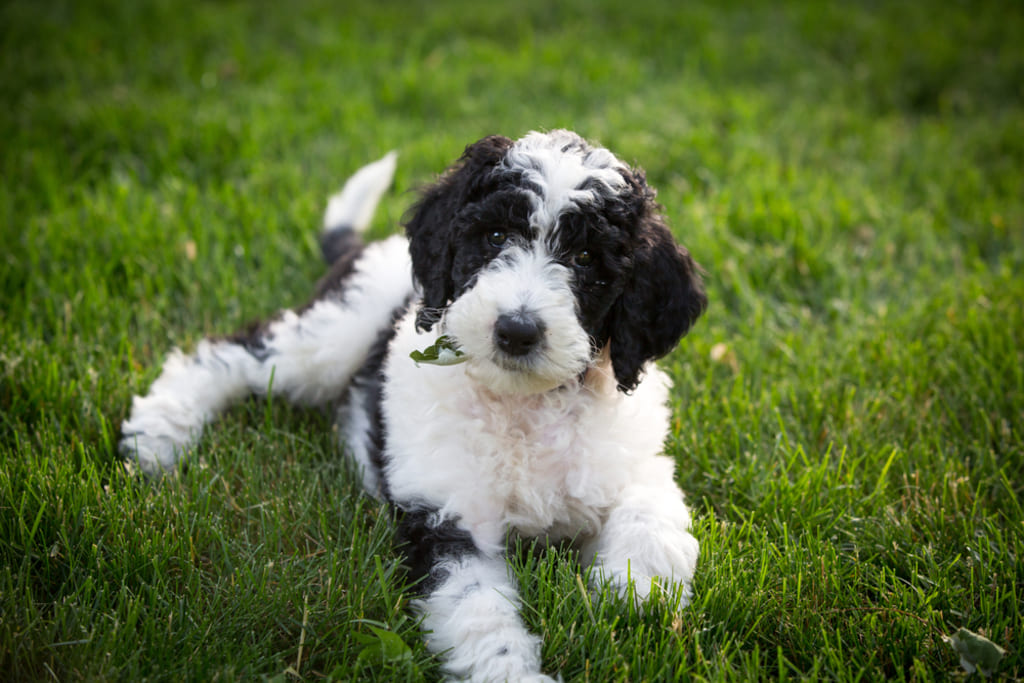
- It is believed that Sheepadog breeds were naturally bred over the years.
- However, it gained popularity in the 1980s due to its hypoallergenic characteristics.
- After this, people with allergies started to cross-breed the two popular dog breeds in hopes of getting a dog breed with low-shedding properties.
- The combination of the Old English Sheepdog and the Standard Poodle resulted in the intelligent, low-shedding Sheepadoodle that many families adore today.
- Sheepadoodle is a large, low-shedding dog that is an excellent companion; therefore, it immediately gained immense popularity.
Appearance
- As we already mentioned, Sheepadoodle is a hybrid breed, which simply means one parent’s characteristics and appearance will be more prominent.
- For example, some Sheepadoodles have the square face of an Old English sheepdog, while others have a more poodle-like domed head.
- These canines also have a thick, fluffy coat, which sometimes has black and white markings. That’s the reason the Sheepadoodle dogs are also known as ‘panda bear’ dogs.
- On average, Sheepadoodle is about 16 to 22 inches tall and weighs about 60-80 pounds.
- However, the size of the Sheepadoodle has variations because one of its parent’s breed poodles is available in different sizes: Standard, Miniature, and Toy.
So, the Sheepadoodle is also available in three sizes:
- Standard Sheepadoodle
- Mini Sheepadoodle
- Toy Sheepadoodles Sheepadoodle
So, how big does a Sheepadoodle get? how much a full grown Sheepadoodle weigh?
Here’s how each one differs in size and weight from the others:
| Toy Sheepadoodle | Mini/Medium Sheepadoodle | Standard Sheepadoodle | |
|---|---|---|---|
| Weight | 10-25 pounds | 25-55 pounds | 55–85 pounds |
| Height | 15 inches or less | 15-22 inches | 22-27 inches |
| Age at Full-Grown | 7.5-11 Months | 11-13 months | 12.5-16 Months |
Coat and Color
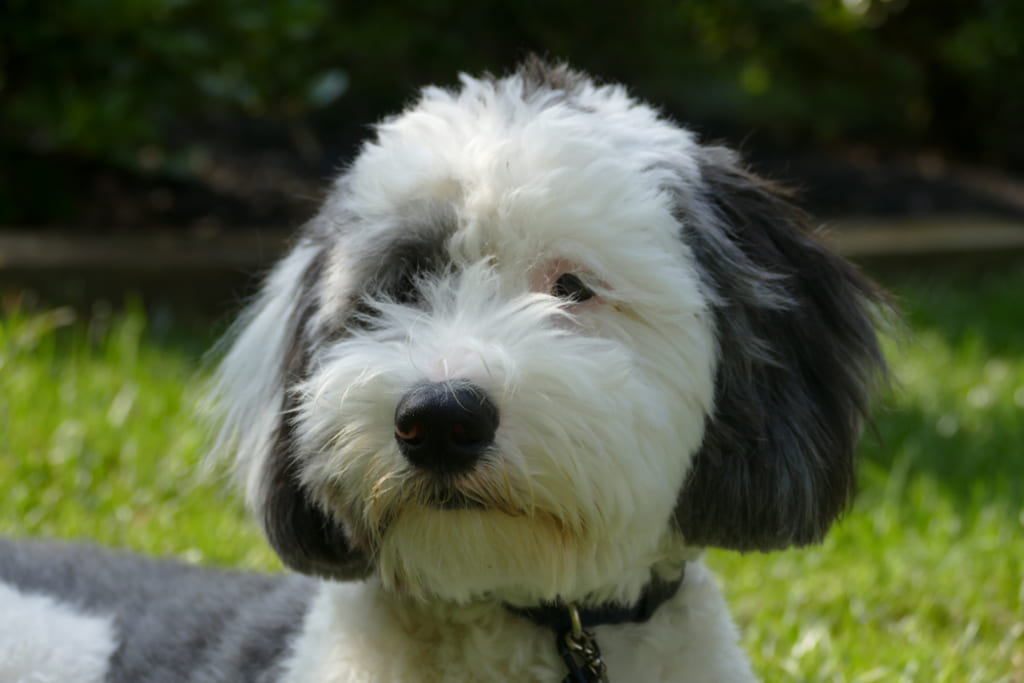
Sheepadoodle’s puppies are available in a wide range of colors, including:
- Black Shepadoodle
- Merle Shepadoodle
- Black and White Shepadoodle
- Gray Shepadoodle
- Silver Shepadoodle
- Brown Shepadoodle
- Red Shepadoodle
- Sable Sheepadoodle
- Grizzle Sheepadoodle
- Blue Shepadoodle
- Fawn Sheepadoodle
- Cream Sheepadoodle
Characteristics and Temperament
- Sheepadoodle dogs are well known for their intelligence, activeness, and affectionate nature.
- This amiable breed is trustworthy and gentle, which is why many people love to have them as their family pets.
- Sheepadoodle temperament is good and this is why they also work in therapy and service work.
- The Sheepadoodle breed has characteristics of both of their parents’ breeds: Old English Sheepdogs and Poodles.
- These canines are highly athletic and energetic dogs who need regular exercise for their well-being.
- They love spending time with their owners and get along well with children and other pets.
- However, they’re also protective and aggressive in the presence of strangers. This is why, along with supervision, proper training and socialization are necessary.
Sheepadoodle is known for its playfulness. These canines enjoy fetch, hide-and-seek, and other interactive games with their owners and other pets.
Health and Nutrition
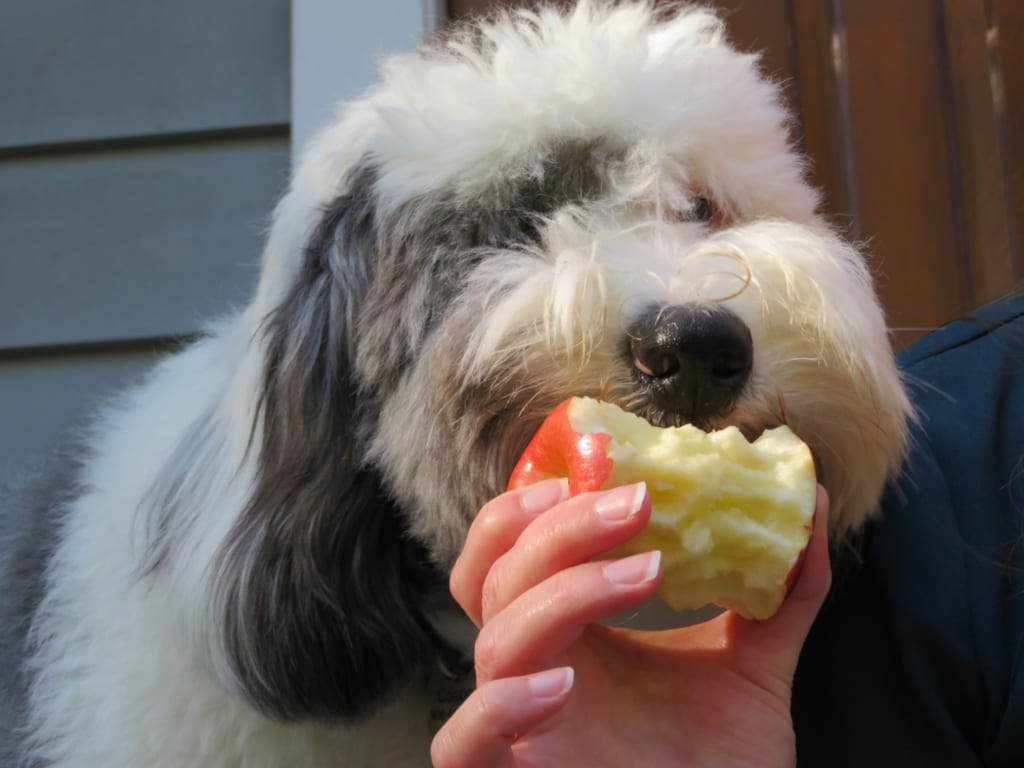
- Sheepadoodles are medium to large breeds; thus, they need a healthy and balanced diet.
- You should always give them high-quality dog food that has an appropriate amount of protein, nutrients, healthy fats, vitamins, and minerals.
- Sheepadoodle full grown dogs should be fed 3-4 times a day. This is important as they require more energy while growing as compared to adults.
- On the other side, give at least 1-2 meals per day to a full grown Sheepadoodle dog.
- Also, keep in mind that every dog is different, so each has different food requirements.
- You can also consult your vet, who will prepare the right feeding chart for your pooch according to its health and lifestyle.
So, the regular diet of a Sheepdogpoo should include the following:
- Dry Food
- Wet Food
- Fats
- Protein
- Carbohydrate
You should NEVER give these foods to a Sheepadoodle:
- Avocado
- Macadamia nuts
- Chocolate
- Onions
- Garlic
- Grapes
- Raisins
When it comes to health problems, just like any other dog breed, Sheepadoodles are also prone to certain health conditions, including:
- Hip dysplasia
- Elbow dysplasia
- Patellar luxation
- Bloat
- Diabetes
- Gastric Dilation Volvulus (GDV)
- Addison’s disease
- Glaucoma
- Von Willebrand’s disease
- Eye problems
NOTE:
Take your Sheepadoodle puppy to the vet for regular checkups and examinations.
Exercise and Training
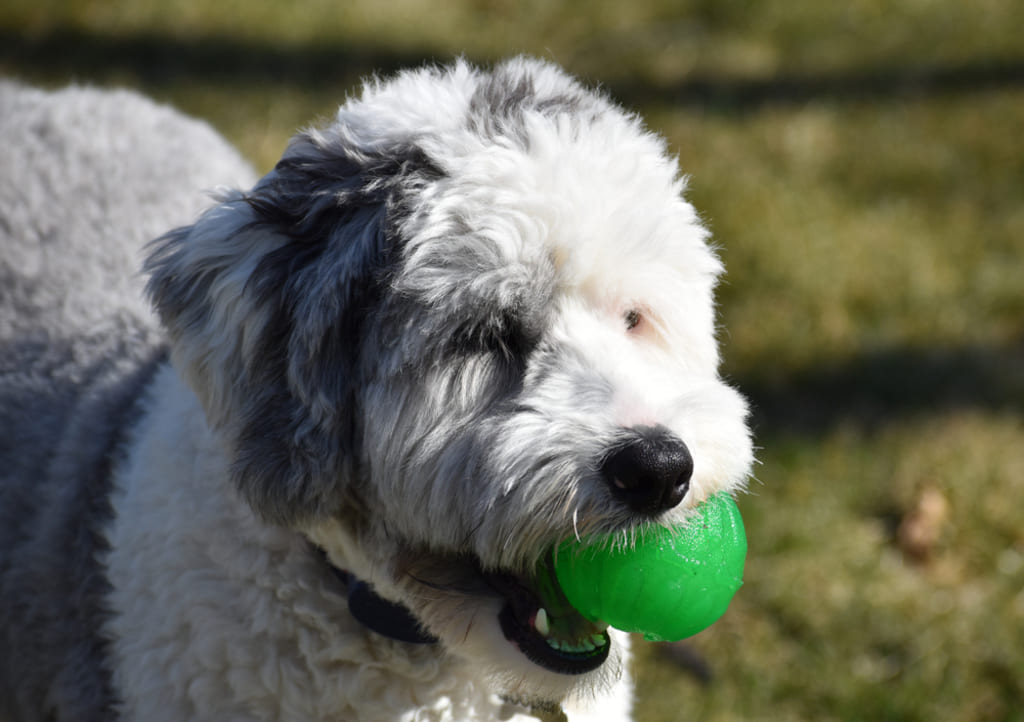
- Sheepadoodles are super active dog breeds that require regular exercise of at least 60 minutes every single day.
- Sheepadoodle puppies need 5 to 15 minutes of activities in the early growth stages for proper development.
- Apart from this, they also enjoy playing outdoors and other physical activities, such as swimming, walking, and hiking.
- These activities are the best ways to maintain a healthy weight and keep them away from boredom.
- When it comes to training, you’ll be happy to know that these canines are easy to train.
- Try positive, reward-based treats and praise training methods to teach them various tricks.
Sheepadoodles love water activities and, in fact, are excellent swimmers. If you have a pool or live near a lake, let your beloved puppy splash and play in the water!
Grooming Needs
For people who can manage a high-maintenance dog, a Sheepadoodle can be a good option!
So, how to groom a Sheepadoodle?
- Even though they inherit beautiful short, wavy, and curly hair from their poodle parents, their coats still don’t shed as much.
- To keep your pup’s coat tangle-free, try to brush it at least 1-2 times a week.
- Apart from this, regular nail trimming and bathing are essential at least once in a while (every 6-8 weeks).
- You can also visit professionals for grooming services like haircuts, nail trimming, and ear cleaning.
Are Sheepadoodles hypoallergenic?

The parent breed, the poodle, is a hypoallergenic dog breed. So, Sheepadoodles are also considered hypoallergenic. However, keep in mind that no breed is 100% allergen-free, which means they shed a bit. So, if you’re extremely sensitive or have severe allergies, a poodle mix like Sheepadoodle is not recommended.
Price
How much is a Sheepadoodle?
The Sheepadoodle price can vary depending on various factors, like the breeder’s reputation, the puppy’s lineage, and location. On average, a Sheepadoodle puppy can cost anywhere between $1,500 and $3,000.
If you’re looking for a puppy at an affordable price, search for ‘Sheepadoodle for sale near me’ on Google, and you’ll get a list of rescue clubs and adoption centers where you can get Sheepadoodle puppies for sale.
NOTE:
Buying a Sheepadoodle is only the initial cost; keep in mind that there will be other additional expenses like food, grooming, training, and medical costs.
Life span
Typically, a Sheepadoodle has a lifespan of 10 to 15 years when provided with proper care and a healthy lifestyle.
Pros and Cons of Sheepadoodle
Are you still confused about whether you should get a Sheepadoodle or not? No worries, below are the advantages and disadvantages of having a Sheepadoodle as a pet:
- Sheep-A-Poo is a highly active, playful, and easy-to-train dog.
- These canines have a good temperament and behave well with small kids and other animals.
- They can give people affection, comfort, and love; thus, they are also well-known as therapy dogs.
- These dogs don’t bark much and are also good watchdogs.
- Sheepadoodles can have separation anxiety when left alone for a long time.
- Sometimes, they can act a little destructively and bark excessively.
- Even though these canines have low shedding, you still have to pay attention to their grooming.
FAQs
Sheepadoodles are wonderful dogs, but there are some things you need to consider before buying them, such as high grooming and exercise routines. They’re also prone to several health conditions, which can lead to additional costs.
As compared to other medium breeds, Sheepadoodles are relatively easy to take care of; however, they still need regular grooming, exercise, and training. These canines thrive on the right environment, love, and attention.
Yes, Sheepadoodles are high maintenance dogs, as they need regular grooming like brushing, bathing, haircuts, and nail clipping.
Final Thoughts
Sheepadoodles are highly energetic, playful, and loving dogs. They have a calm personality and behave well with kids and other animals. They’re also relatively easy to train. So, there is no doubt that these adorable canines are good family pets. However, you have to give them plenty of play and exercise time to maintain their energy level.
Explore Further:











